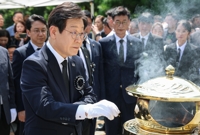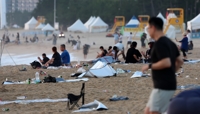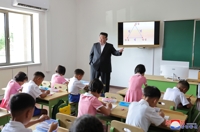Only 34 pct of S. Korean elites favor nuclearization: CSIS poll
By Song Sang-ho
WASHINGTON, April 29 (Yonhap) -- Only a third of South Korean academics, experts and other elites support nuclearization of their country, a U.S. think tank poll showed Monday, a finding that contrasts with greater support shown in surveys of the general public.
The Center for Strategic and International Studies (CSIS) released a report on the outcome of the poll conducted on over 1,000 "strategic elites" in South Korea from Jan. 15 to March 17. The report, titled "Breaking Bad, South Korea's Nuclear Option," was authored by Victor Cha, senior vice president for Asia and Korea Chair at CSIS.
It found that only 34 percent of the elites said yes to the question of whether South Korea should have nuclear arms, while 53 percent said no with 13 percent saying that they are "not sure."
The chosen demographic of the elites, including legislators, business elites and current and former officials, is understood to better reflect both the state of national discussion and the views influential in decision-making on issues of national security, the report said.
"Thirty-four percent support represents a much lower level of elite support than that of the general public, which averages at 61 percent based on 36 public opinion polls since September 2017 -- and a substantially lower level of support than a recent public poll that puts support as high as 76.6 percent," the report said.
"Strategic elites, whose views matter most in national security decision-making, by a wide margin do not favor a nuclear South Korea," it added.
Among the respondents in support of nuclearization, 68 percent identified themselves as conservatives, 22 percent as moderates and 10 percent as progressives or moderate progressives.
Among those who said no to the nuclearization question, 36 percent were self-identified as conservatives, 36 percent as progressives or moderate progressives and 28 percent as moderates.
Of those who answered no to the question, 43 percent said it was because the country can be targeted by economic sanctions and lose prestige from violating international norms. Twenty six percent of them cited potential damage to the South Korea-U.S. alliance and possible fallout from the acquisition of nuclear weapons.
But the report showed that should former President Donald Trump return to the White House, it could affect nuclear debate in South Korea. Known for his America-first policy credo, Trump seeks reelection in the Nov. 5 presidential election where he is to face incumbent President Joe Biden.
Among the elites who are not supportive of nuclearization, 51 percent said that their support for a nuclear South Korea will increase in the event of the return of "America-first" policy that "denigrates allies and seeks retrenchment,"" according to the poll.
Ninety percent of those supportive of nuclearization said that their support for a nuclear South Korea will increase in case of America-first policy's return.
The poll came as the debate over whether South Korea should go nuclear lingers as Pyongyang has been doubling down on its push to develop nuclear weapons and diverse delivery vehicles.

Victor Cha, senior vice president for Asia and Korea Chair at the Center for Strategic and International Studies (CSIS), speaks during an interview with Yonhap News Agency at CSIS headquarters in Washington on Oct. 5, 2023. (Yonhap)
[email protected]
(END)
-
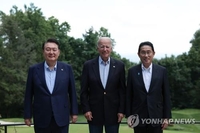 S. Korea, U.S., Japan leaders to announce joint statement Sunday to mark Camp David summit
S. Korea, U.S., Japan leaders to announce joint statement Sunday to mark Camp David summit -
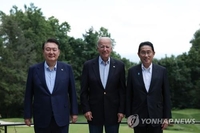 (LEAD) Leaders of S. Korea, U.S., Japan reaffirm commitment to trilateral security cooperation
(LEAD) Leaders of S. Korea, U.S., Japan reaffirm commitment to trilateral security cooperation -
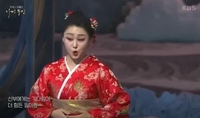 Media watchdog to review punitive measures against KBS for airing Japanese anthem on Liberation Day
Media watchdog to review punitive measures against KBS for airing Japanese anthem on Liberation Day -
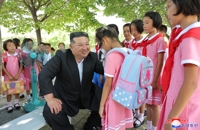 N. Korea's Kim attends demonstration class for children from flood-hit region
N. Korea's Kim attends demonstration class for children from flood-hit region -
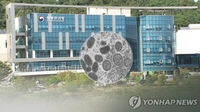 S. Korea to enhance mpox surveillance following WHO emergency alert
S. Korea to enhance mpox surveillance following WHO emergency alert
-
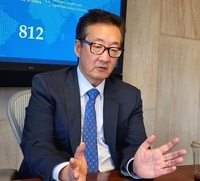 Only 34 pct of S. Korean elites favor nuclearization: CSIS poll
Only 34 pct of S. Korean elites favor nuclearization: CSIS poll -
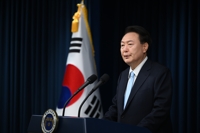 Yoon's approval rating falls for 3 weeks straight to 30.2 pct
Yoon's approval rating falls for 3 weeks straight to 30.2 pct -
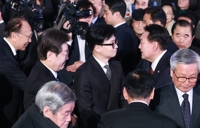 Disagreement over ambassador, presidential aide opens up fresh rift between Yoon, PPP leader
Disagreement over ambassador, presidential aide opens up fresh rift between Yoon, PPP leader -
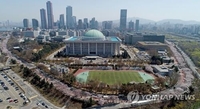 Political parties ramp up campaign efforts amid shifting opinion polls
Political parties ramp up campaign efforts amid shifting opinion polls -
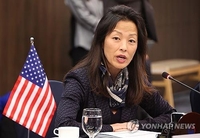 (News Focus) U.S. focus on 'interim' steps with N. Korea raises questions about policy direction
(News Focus) U.S. focus on 'interim' steps with N. Korea raises questions about policy direction

